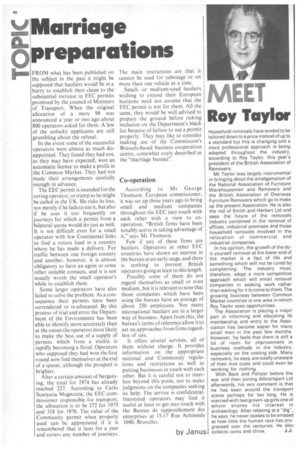Marriage preparations
Page 48

If you've noticed an error in this article please click here to report it so we can fix it.
FROM what has been published on the subject in the past it might be supposed that hauliers would be in a hurry to establish their claim to the substantial increase in EEC permits promised by the council of Ministers of Transport. When the original allocation of a mere 99 was announced a year or two ago about 800 operators asked for them. A few of the unlucky applicants are still grumbling about the refusal.
In the event some of the successful operators were almost as much disappointed. They found they had not, as they may have expected, won an automatic licence to make a profit in the Common Market. They had not made their arrangements carefully enough in advance.
The EEC permit is intended for the roving operator, or tramp as he might be called in the UK. He risks its loss, not merely if he fails to use it, but also if he uses it too frequently on journeys for which a permit from a bilateral quota would do just as well. It is not difficult even for a small operator with few Continental links to find a return load in a country where he has made a delivery. For traffic between one foreign country and another, however, it is almost obligatory to have an agent or some other suitable contacts, and it is not usually worth the small operator's while to establish them.
Some larger operators have also failed to solve the problem. As a consequence their permits have been surrendered or re-allocated. By this process of trial and error the Department of the Environment has been able to identify more accurately than at the outset the operators most likely to make the best use of a supply of permits which from a trickle is rapidly becoming a flood. Operators who supposed they had won the first round now find themselves at the end of a queue, although the prospect is brighter.
After a certain amount of bargaining, the total for 1974 has already reached 227. According to Carlo Scarascia Mugnozza, the EEC commissioner responsible for transport, the allocation is to be 272 for 1975 and 318 for 1976. The value of the Community permit when properly used can be appreciated if it is remembered that it lasts for a year and covers any number of journeys. The main restrictions are that it cannot be used for cabotage or on more than one vehicle at a time.
Smallor medium-sized hauliers wishing to extend their European horizons need not assume that the EEC permit is not for them. All the same, they would be well advised to prepare the ground before risking inclusion on the Department's black list because of failure to use a permit properly. They may like to consider making use of the Commission's Brussels-based business cooperation centre, somewhat coyly described as the "marriage bureau".
Co-operation According to Mr George Thomson, European commissioner, it was set up three years ago to bring small and medium companies throughout the EEC into touch with each other with a view to cooperation. "British firms have been notably active in taking advantage of it," says Mr Thomson.
Few if any of these firms are hauliers. Operators in other EEC countries have shown an interest in the bureau at an early stage, and there is nothing to prevent British operators going at least to this length.
Possibly some of them do not regard themselves as small or even medium, but it is relevant to note that those companies which have been using the bureau have an average of about 250 employees. Not many international hauliers are in a larger way of business. Apart from this, the bureau's terms of reference allow it to act on approaches from firms regardless of size.
It offers several services, all of them without charge. It provides information on the appropriate national and Community regulations and restrictions as well as putting businesses in touch with each other. But it is careful not to interfere beyond this point, nor to make judgments on the companies seeking its help. The service is confidential. Interested operators may find it useful at least to get into touch with the Bureau de rapprochement des enterprises at 15-17 Rue Achimede 1040, Bruxelles.
by Janus








































































































